- Home
- Ian Buruma
Theater of Cruelty Page 2
Theater of Cruelty Read online
Page 2
Why has it come to this? Why do so many people wish to identify themselves as vicarious victims? There is no general answer. Histories are different, and so are their uses. Memories, fictionalized or real, of shared victimhood formed the basis of much nineteenth-century nationalism. But nationalism, though not always absent, does not seem to be the main driving force for vicarious victims today. There is something else at work. First there is the silence of the actual victims: the silence of the dead, but also of the survivors. When the survivors of the Nazi death camps arrived in Israel on rusty, overloaded ships, shame and trauma prevented most of them from talking about their suffering. Victims occupied a precarious place in the new state of Jewish heroes. It was as though victimhood were a stain that had to be erased or overlooked. And so most survivors preferred to keep quiet. A similar thing happened in Europe, particularly in France. President de Gaulle built a roof for all those who had come through the war, former members of the resistance, Vichyistes, collabos, Free French, and Jewish survivors: officially all were citizens of eternal France, and all had resisted the German foe. Since the last thing French Jews wanted was to be singled out once again as a separate category, the survivors acquiesced in this fiction and kept quiet.
Even though the suffering of Japanese-Americans, interned by their own government as a “Jap” Fifth Column, cannot be compared to the destruction of European Jews, their reaction after the war was remarkably similar. Like the French Jews, they were happy to be treated as ordinary citizens and to blanket the humiliation they had suffered with silence. The situation in China was more political. Little was made in the People’s Republic of the Nanking Massacre because there had been no Communist heroes in the Nationalist capital in 1937. Indeed there had been no Communists there at all. Many of those who died in Nanking, or Shanghai, or anywhere in southern China, were soldiers in Chiang Kai-shek’s army. Survivors with the wrong class or political backgrounds had enough difficulty surviving Maoist purges to worry too much about what had happened under the Japanese.
It was left up to the next generation, the sons and daughters of the victims, to break the silence. In the case of China, it took a change of politics: Deng Xiaoping’s open-door policy toward Japan and the West had to be wrapped in a nationalist cloak; dependency on Japanese capital was compensated for by stabs at the Japanese conscience. It was only after 1982 that the Communist government paid any attention to the Nanking Massacre at all. But leaving China aside for the moment, why did the sons and daughters of other survivors decide to speak up in the 1960s and 1970s? How do we explain the doggedness of a man like Serge Klarsfeld, whose father was killed at Auschwitz, and who has done more than any Frenchman to bring the history of French Jews to public notice?
There is a universal piety in remembering our parents. It is a way of honoring them. But remembering our parents, especially if their suffering remained mute and unacknowledged, is also a way of asserting ourselves, of telling the world who we are. It is understandable that French Jews or Japanese-Americans wished to slip quietly into the mainstream by hiding their scars, as though their experiences had been like everyone else’s, but to their children and grandchildren this was not good enough. It was as if part of themselves had been amputated by the silence of their parents. Speaking openly about the communal suffering of one’s ancestors—as Jews, Japanese-Americans, Chinese, Hindus, etc.—can be a way of “coming out,” as it were, of nailing the colors of one’s identity to the mast. The only way a new generation can be identified with the suffering of previous generations is for that suffering to be publicly acknowledged, over and over again. This option is especially appealing when few or indeed no other tags of communal identity remain, often because of the survivors’ desire to assimilate. When Jewishness is reduced to a taste for Woody Allen movies and bagels, or Chineseness to Amy Tan novels and dim sum on Sundays, the quasi authenticity of communal suffering will begin to look very attractive.
The scholar K. Anthony Appiah made this point in an analysis of identity politics in contemporary America.5 The languages, religious beliefs, myths, and histories of the old countries tend to fade away as the children of immigrants become Americans. This often leads to defensive claims of Otherness, especially when there is little Otherness left to defend. As Appiah said about hyphenated Americans, including African-Americans:
Their middle-class descendants, whose domestic lives are conducted in English and extend eclectically from Seinfeld to Chinese takeout, are discomfited by a sense that their identities are shallow by comparison with those of their grandparents; and some of them fear that unless the rest of us acknowledge the importance of their difference, there soon won’t be anything worth acknowledging.
He goes on to say that “the new talk of ‘identity’ offers the promise of forms of recognition and of solidarity that could make up for the loss of the rich, old kitchen comforts of ethnicity.” Alas, however, those forms too often resemble the combination of kitsch and death described by Friedlander. Identity, more and more, rests on the pseudoreligion of victimhood. What Appiah says about ethnic minorities might even be applied to women: the more emancipated women become, the more some extreme feminists begin to define themselves as helpless victims of men.
But surely nationalities are not the same as ethnic minorities in America, let alone women. Indeed they are not. By and large, people of different nations still speak different languages, have different tastes in food, and share distinct histories and myths. These distinctions, however, are becoming fuzzier all the time. To a certain extent, especially in the richer countries, we are all becoming minorities in an Americanized world, where we watch Seinfeld while eating Chinese takeout. Few nations are defined by religion anymore, even though some, such as Iran and Afghanistan, have busily been reviving that definition. National histories, celebrating national heroes, are fading away in favor of social studies, which have replaced patriotic propaganda based on historical continuity with celebrations of contemporary multiculturalism. Literary canons, though perhaps less under siege in Europe than they are in the United States, are also becoming increasingly obsolete. Combined with a great deal of immigration to such countries as Britain, Germany, France, and Holland, these developments have eroded what kitchen comforts of ethnicity remained in European nation-states.
Perhaps the strongest, most liberating, and most lethal glue that has bound national communities together is the way we choose or are forced to be governed. Some nations have been defined mainly by their political systems. The United States is such a place. Sometimes politics and religion are combined in monarchies. Nowhere is politics entirely without irrational elements: customs, religion, and historical quirks all leave their marks. It was an extreme conceit born of the Enlightenment and the French Revolution that political utopias could be based on pure reason. Nationalism, in the sense of worshiping the nation-state as an expression of the popular will, was part of this. Politics was destined to replace the bonds of religion, or region, or race. This did some good. It also did a great deal of harm. The twin catastrophes of communism and fascism showed how dangerous it is to see the nation-state as a pure expression of the people’s will. In any event, the ideological split between left and right, which was spawned by the division in the French National Assembly in 1789 and was eventually hardened by the cold war, effectively collapsed with the end of the Soviet Union. And the effects of global capitalism and multinational political arrangements, especially in Europe, have to some extent undermined the perception that nations are defined by the way they are governed. For it doesn’t seem to matter anymore how they are governed: decisions always appear to be made somewhere else. The current English obsession with the culture of Englishness has come just at the time of increasing integration into European institutions.
So where do we go in this disenchanted world of broken-down ideologies, religions, and national and cultural borderlines? From a secular, internationalist, cosmopolitan point of view, it may not seem such a bad world. Tha
t is, of course, if one is living in the wealthy, liberal West. It is surely good that nationalistic historical narratives have been discarded, that homosexuals can come out and join the mainstream, that women can take jobs hitherto reserved for men, that immigrants from all over the world enrich our cultures, and that we are no longer terrorized by religious or political dogma. A half-century of secular, democratic, progressive change has surely been a huge success. We have finally been liberated from irrational ethnic comforts. And yet, after all that, a growing number of people seek to return to precisely such comforts, and the form they often take is the pseudoreligion of kitsch and death. Segev argues that the modern Israeli tendency to turn the Holocaust into a civic religion is a reaction against secular Zionism. The “new man”—socialist, heroic, pioneering—turned out to be inadequate. More and more, people want to rediscover their historical roots. To be serious about religion is demanding, however. As Segev says, “Emotional and historical awareness of the Holocaust provides a much easier way back into the mainstream of Jewish history, without necessarily imposing any real personal moral obligation. The ‘heritage of the Holocaust’ is thus largely a way for secular Israelis to express their connection to Jewish heritage.”6
The same is true for many of us, whether Jewish, Chinese-American, or whatnot. The resurgence of Hindu nationalism in India, for instance, is especially strong among middle-class Hindus, who are reacting against the Nehruvian vision of a socialist, secular India. Since many urban, middle-class Hindus have only a superficial knowledge of Hinduism, aggressive resentment of Muslims is an easier option. And so we have the peculiar situation in India of a majority feeling set upon by a poorer, much less powerful minority. But there is a larger context, too, particularly in the West. Just as the Romantic idealism and culture worship of Herder and Fichte followed the secular rationalism of the French philosophes, our attraction to kitsch and death heralds a new Romantic age, which is antirational, sentimental, and communitarian. We see it in the politics of Clinton and Blair, which have replaced socialist ideology with appeals to the community of feeling, where we all share one another’s pain. We saw it in the extraordinary scenes surrounding the death of Princess Diana, when the world, so TV reporters informed us, united in mourning. Princess Diana was in fact the perfect embodiment of our obsession with victimhood. Not only did she identify with victims, often in commendable ways, hugging AIDS patients here and homeless people there, but she was seen as a suffering victim herself: of male chauvinism, royal snobbery, the media, British society, and so on. Everyone who felt victimized in any way identified with her, especially women and members of ethnic minorities. And it says something about the state of Britain, changed profoundly by immigration, American influence, and common European institutions, yet unsure of its status in Europe, that so many people felt united as a nation only when the princess of grief had died.
This sharing of pain has found its way into the manner in which we look at history, too. Historiography is less and less a matter of finding out how things really were or trying to explain how things happened. For not only is historical truth irrelevant but it has become a common assumption that there is no such thing. Everything is subjective or a sociopolitical construct. And if the civic lessons we learn at school teach us anything, it is to respect the truths constructed by others, or, as it is more usually phrased, the Other. So we study memory, that is to say, history as it is felt, especially by its victims. By sharing the pain of others, we learn to understand their feelings and to get in touch with our own.
In Bridge Across Broken Time, Vera Schwarcz, a professor of East Asian studies at Wesleyan University, links her own memories as the child of Jewish Holocaust survivors with those of Chinese victims of the Nanking Massacre and the violent crackdown in 1989 on Tiananmen Square. With images of 1989 fresh in her mind, Schwarcz visits Yad Vashem, the Holocaust memorial outside Jerusalem. There she realizes
the immensity both of the suffering that could not be commemorated in China after 1989 and of the Nanking Massacre of 1937 with its countless dead that had yet to become imprinted upon communal memory in Japan and the United States. I also sensed the magnitude of my own loss that could not be assuaged by the light of a candle, even if it was reflected one million times.7
Now, I don’t doubt the nobility of Professor Schwarcz’s sentiments, but I do wonder whether this sort of thing—even Maya Angelou’s poetry makes a cameo appearance in her book—is enlightening in any historical sense. In fact it is ahistorical, because the actual experiences of historical victims get blended in a kind of soup of pain. Although it is undoubtedly true that Chinese, Jews, gays, and others have suffered, it is not so that they all suffered in the same way. The distinctions tend to get lost. It is all too typical of our neoromantic age that a well-known Dutch ballet dancer and novelist named Rudi van Dantzig should announce in a pamphlet issued by the Resistance Museum in Amsterdam that homosexuals and other minorities in the Netherlands should take anti-Nazi resisters as models for their struggle against social discrimination.
But intellectual enlightenment is probably not the issue here. Instead there is authenticity. When all truth is subjective, only feelings are authentic, and only the subject can know whether his or her feelings are true or false. One of the most remarkable statements along these lines was written by the novelist Edmund White. In an article about AIDS literature, he argues that literary expressions of the disease cannot be judged by critical standards. As he puts it, a trifle histrionically: “I can scarcely defend my feelings beyond saying that it strikes me as indecent to hand out grades to men and women on the edge of the grave.” He then stretches AIDS literature to encompass multiculturalism in general, and states not only that multiculturalism is incompatible with a literary canon but that he’d “go even further and say multiculturalism is incompatible with the whole business of handing out critical high and low marks.” In other words, our critical faculties cannot be applied to novels, poems, essays, or plays expressing the pain of Others. As White says about the AIDS genre, “We will not permit our readers to evaluate us; we want them to toss and turn with us, drenched in our night sweats.”8
What makes us authentic, then, as Jews, homosexuals, Hindus, or Chinese, is our sense of trauma, and thus our status as victims, which cannot be questioned. The vulgar Freudianism of this view is remarkable in an age of debunking Freud. In fact, Freud’s endeavors were themselves a brilliant product of late-nineteenth-century identity politics. To secular, bourgeois, assimilated German and Austrian Jews, psychoanalysis was a logical route to self-discovery. What Freud did for his Viennese patients is in a way what Edmund White and other identity politicians are now doing for their various “communities,” and real politicians are borrowing their language.
Apart from the sentimentality that this injects into public life, the new religions of kitsch and death are disturbing for other reasons. For all Schwarcz’s talk of building bridges between mourning communities, I think the tendency to identify authenticity in communal suffering actually impedes understanding among people. Feelings can only be expressed, not discussed or argued about. This cannot result in mutual understanding but only in mute acceptance of whatever people wish to say about themselves, or in violent confrontation. The same is true of political discourse. Ideology has caused a great deal of suffering, to be sure, particularly in political systems where ideologies were imposed by force. But without any ideology political debate becomes incoherent, and politicians appeal to sentiments instead of ideas. And this can easily result in authoritarianism, for, again, you cannot argue with feelings. Those who try are denounced not for being wrong but for being unfeeling, uncaring, and thus bad people who don’t deserve to be heard.
The answer to these problems is not to tell people to go back to their traditional places of worship, in an attempt to supplant pseudoreligions with established ones. I am not opposed to organized religion on principle, but as a secular person myself it is not my place to promote it. Nor am I
against building memorials for victims of wars or persecution. The decision by the German government to build a Holocaust museum in Berlin is laudable, because it will also contain a library and document center. Without such a center it would just be a colossal monument. In the new plan memory will go together with education. Literature, of fact and fiction, about individual and communal suffering should have its place. History is important. Indeed there should be more of it. And it would be perverse to take issue with the aim of fostering tolerance and understanding of other cultures and communities. But the steady substitution of political argument in public life with the soothing rhetoric of healing seems wrong.
We can make a start toward resolving the problem by drawing distinctions where few are made now. Politics is not the same as religion or psychiatry, even though it may be influenced by both. Memory is not the same as history, and memorializing is different from writing history. Sharing a cultural heritage is more than “negotiating an identity.” It is perhaps time for those of us who have lost religious, linguistic, or cultural ties with our ancestors to admit to that and let go. Finally, and I think this goes to the heart of the matter, we should recognize that truth is not just a point of view. There are facts that are not made up but real. And to pretend there is no difference between fact and fiction, or that all writing is fiction, is to paralyze our capacity to distinguish truth from falsehood. And that is the worst betrayal of Primo Levi and all those who suffered in the past. For Levi’s fear was not that future generations would fail to share his pain but that they would fail to recognize the truth.

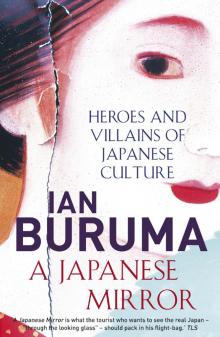 A Japanese Mirror
A Japanese Mirror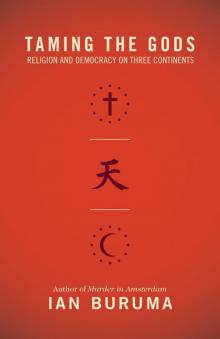 Taming the Gods
Taming the Gods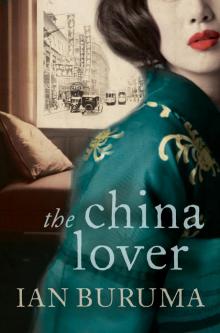 The China Lover
The China Lover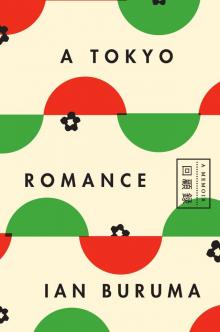 A Tokyo Romance
A Tokyo Romance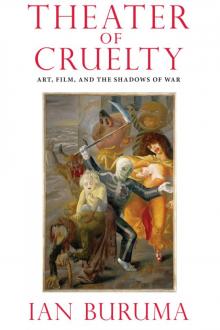 Theater of Cruelty
Theater of Cruelty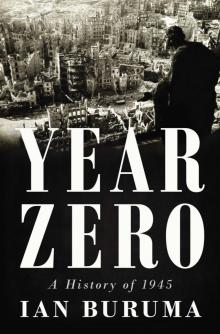 Year Zero
Year Zero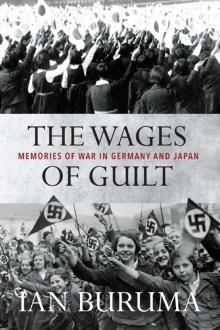 The Wages of Guilt
The Wages of Guilt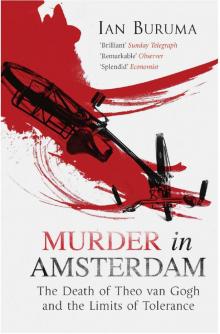 Murder in Amsterdam
Murder in Amsterdam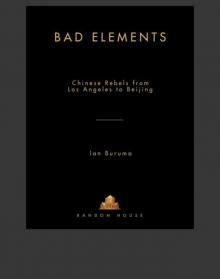 Bad Elements
Bad Elements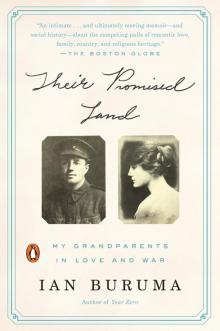 Their Promised Land
Their Promised Land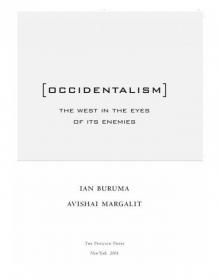 Occidentalism
Occidentalism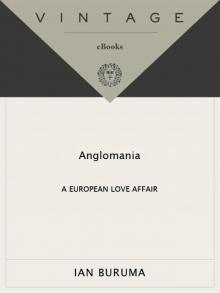 Anglomania
Anglomania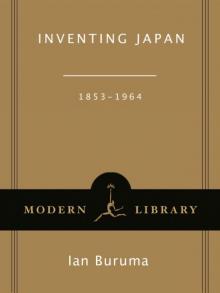 Inventing Japan: 1853-1964 (Modern Library Chronicles)
Inventing Japan: 1853-1964 (Modern Library Chronicles)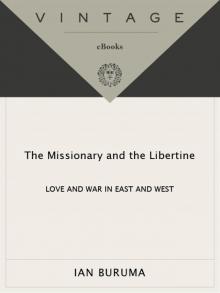 The Missionary and the Libertine
The Missionary and the Libertine